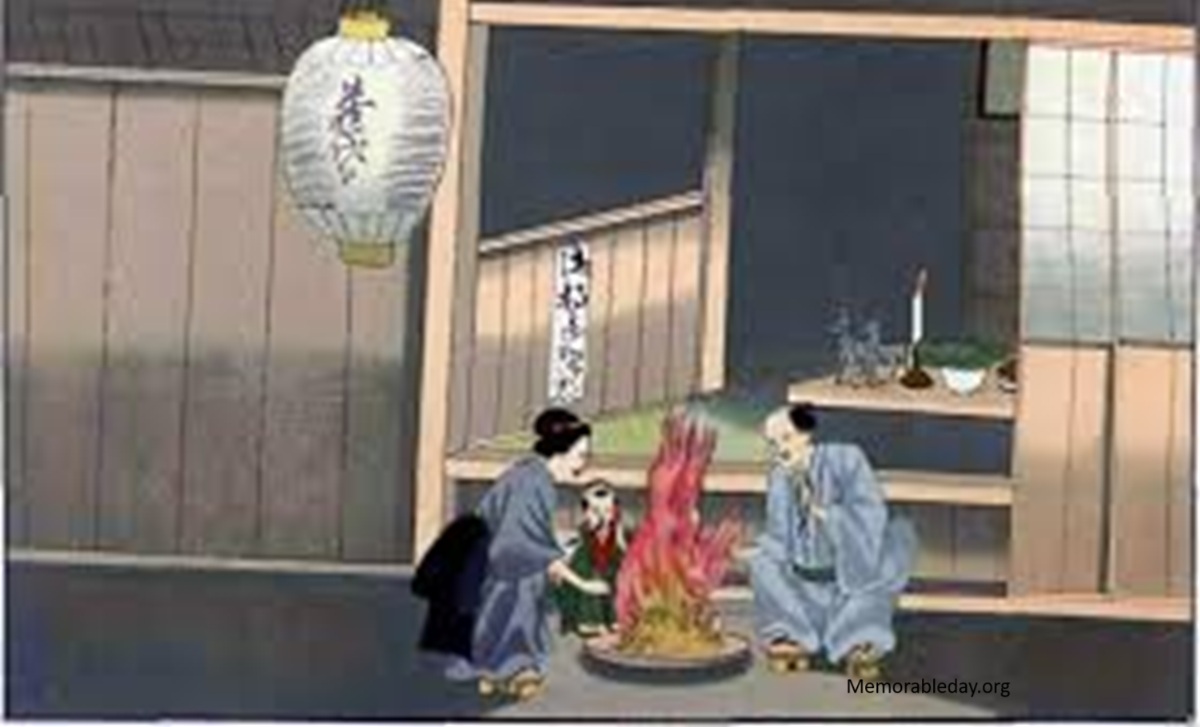
The Obon Festival, also known simply as Obon, is a traditional Buddhist event held in Japan to honor the spirits of deceased ancestors. This deeply spiritual and cultural celebration brings families together as they remember and pay tribute to their loved ones. With vibrant lantern displays, captivating dances, and heartfelt ceremonies, Obon is a time of reflection, gratitude, and reunion.
History of Obon Festival
Obon traces its origins to Buddhist teachings and folklore, particularly the story of Mokuren, a disciple of Buddha. According to legend, Mokuren used his spiritual powers to see his deceased mother suffering in the realm of hungry ghosts. Distressed, he sought Buddha’s guidance, who advised him to make offerings to monks at the end of their summer retreat. By doing so, Mokuren freed his mother, inspiring the practice of honoring ancestors during Obon. Over centuries, this tradition evolved, blending Buddhist customs with Japanese cultural elements to become the festival we know today.
Also read:National Prosecco Day
When is Obon Festival Celebrated?
Obon is celebrated at different times across Japan, depending on regional customs. In most areas, including Tokyo, it is observed from July 13th to 15th. However, in many other regions, such as Kyoto and rural areas, Obon takes place from August 13th to 15th. The festival’s timing aligns with the lunar calendar, ensuring a connection to its traditional roots.
How is Obon Festival Celebrated?
Obon is marked by a variety of customs and activities, each holding deep significance. Families clean and decorate the graves of their ancestors, offering food, incense, and flowers. Bon Odori, a lively and colorful dance performed in town squares, symbolizes the spirits’ joyful return. Lanterns, both floating on rivers (toro nagashi) and hanging at home, guide spirits back to the afterlife. Temples and communities host events, creating a warm and festive atmosphere where people can honor the past while embracing the present.
Why is Obon Festival Celebrated?
The Obon Festival is celebrated to express gratitude and respect for ancestors who have passed away. It is believed that during this time, spirits return to visit their families. By engaging in rituals and festivities, people acknowledge the connection between the living and the dead, reinforcing family bonds and spiritual harmony. More than just a religious event, Obon is a cultural phenomenon that fosters unity, remembrance, and appreciation for heritage.
Celebrate Obon Festival on August 13th
On August 13th, many families begin their Obon observance by welcoming their ancestors’ spirits home. Whether through lighting lanterns, preparing special meals, or participating in community events, this day marks the start of a meaningful and heartfelt tradition. If you wish to experience the beauty of Obon, consider visiting a local festival, watching Bon Odori performances, or setting up a small altar to honor your own ancestors.
Obon Festival Quotes
- “Honor the past, embrace the present, and light the way for the future.”
- “Obon is a time to remember, cherish, and celebrate our loved ones.”
- “The lanterns we light guide the spirits back home with love.”
- “In remembrance, we find peace and gratitude.”
- “Dancing under the summer sky, we welcome our ancestors’ spirits.”
- “Obon is a bridge between generations, uniting hearts across time.”
- “Each lantern carries a message of love and remembrance.”
- “Through Bon Odori, we dance with the spirits of our ancestors.”
- “The souls of the past live on in our hearts.”
- “By honoring the departed, we strengthen the bonds of family.”
- “Tradition keeps our history alive and our ancestors close.”
- “Obon reminds us that love transcends time and space.”
- “The glow of lanterns mirrors the warmth of cherished memories.”
- “Let the festival bring joy to our hearts and peace to our souls.”
- “In each prayer, there is a whisper of love from those who came before us.”
- “Obon is not just a ritual—it’s a heartfelt reunion.”
- “Through remembrance, we honor the lives that shaped our own.”
- “Every flickering candle is a testament to everlasting love.”
- “Obon teaches us that those we love never truly leave us.”
- “Celebrate, remember, and cherish—this is the essence of Obon.”
Obon Festival Wishes
- “May the spirits of your ancestors bless you with peace and happiness.”
- “Wishing you a meaningful and joyous Obon Festival.”
- “May your Obon be filled with love, light, and remembrance.”
- “Sending heartfelt prayers to you and your loved ones this Obon.”
- “May the glow of the lanterns bring comfort and warmth to your heart.”
- “Wishing you a peaceful Obon full of cherished memories.”
- “May the spirits of your ancestors guide you with wisdom.”
- “Sending love and blessings as you honor your loved ones this Obon.”
- “May the Bon Odori dance fill your heart with joy.”
- “Wishing you a wonderful Obon celebration with family and friends.”
The Obon Festival is a profound celebration that bridges generations, honors ancestors, and strengthens the bonds of family and community. Whether through lantern lighting, traditional dances, or heartfelt prayers, this festival offers an opportunity to reflect on the past while embracing the present. By participating in Obon, we acknowledge the timeless connection between the living and the departed, ensuring that love and gratitude remain at the heart of our lives.
Celebrate Obon Festival FAQs and answer
Q: What is the main purpose of Obon?
A: Obon is a Buddhist festival dedicated to honoring deceased ancestors and expressing gratitude for their guidance and influence.
Q: How long does the Obon Festival last?
A: Obon typically lasts for three days, though specific dates vary by region.
Q: What is Bon Odori?
A: Bon Odori is a traditional dance performed during Obon to celebrate and welcome ancestral spirits.
Q: Do people exchange gifts during Obon?
A: While gifts are not a primary aspect, offerings such as food, incense, and flowers are commonly made at graves and home altars.
Q: Can non-Japanese people participate in Obon?
A: Absolutely! Many communities welcome everyone to join in the festivities, including dancing, lantern lighting, and memorial ceremonies.
Celebrate Obon with love, remembrance, and gratitude!






